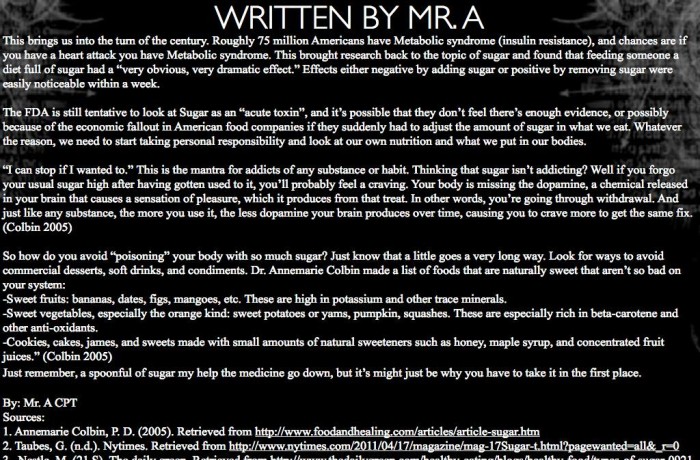This brings us into the turn of the century. Roughly 75 million Americans have Metabolic syndrome (insulin resistance), and chances are if you have a heart attack, you have Metabolic syndrome. This brought research back to the topic of sugar and found that feeding someone a diet full of sugar had a "very obvious, very dramatic effect." Effects either negative by adding sugar or positive by removing sugar were easily noticeable within a week.
The FDA is still tentative to look at Sugar as an "acute toxin", and it's possible that they don't feel there's enough evidence, or possibly because of the economic fallout in American food companies if they suddenly had to adjust the amount of sugar in what we eat. Whatever the reason, we need to start taking personal responsibility and look at our own nutrition and what we put in our bodies.
"I can stop if I wanted to." This is the mantra for addicts of any substance or habit. Thinking that sugar isn't addicting? Well if you forgo your usual sugar high after having gotten used to it, you'll probably feel a craving. Your body is missing the dopamine, a chemical released in your brain that causes a sensation of pleasure, which it produces from that treat. In other words, you're going through withdrawal. And just like any substance, the more you use it, the less dopamine your brain produces over time, causing you to crave more to get the same fix. (Colbin 2005)
So how to you avoid "poisoning" your body with so much sugar? Just know that a little goes a very long way. Look for ways to avoid commercial desserts, soft drinks, and condiments. Dr. Annemarie Colbin made a list of foods that are naturally sweet that aren't so bad on your system:
- Sweet fruits: bananas, dates, figs, mangoes, etc. These are high in potassium and other trace minerals.
- Sweet vegetables, especially the orange kind: sweet potatoes or yams, pumpkin, squashes. These are especially rich in beta-carotene and other anti-oxidants.
- Cookies, cakes, jams, and sweets made with small amounts of natural sweeteners such as honey, maple syrup, and concentrated fruit juices." (Colbin 2005)
Sources:
- Annemarie Colbin, P.D. (2005). Retrieved from http://www.foodandhealing.com/articles/article-sugar.htm
- Taubes, G. (n.d.). Nytimes. Retrieved from http://www.nytimes.com/2011/04/17/magazine/mag-17Sugar-t.html?pagewanted=all&_r=0
- Nestle, M. (21,S). The daily green. Retrieved from http://www.thedailygreen.com/healthy-eating/blogs/healthy-food/types-of-sugar-0921


